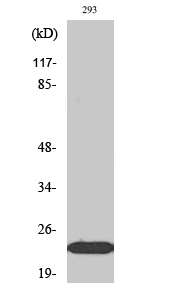

| WB | 咨询技术 | Human,Mouse,Rat |
| IF | 咨询技术 | Human,Mouse,Rat |
| IHC | 1/100-1/300 | Human,Mouse,Rat |
| ICC | 1/200-1/1000 | Human,Mouse,Rat |
| FCM | 咨询技术 | Human,Mouse,Rat |
| Elisa | 1/10000 | Human,Mouse,Rat |
| Aliases | EFNA1; EPLG1; LERK1; TNFAIP4; Ephrin-A1; EPH-related receptor tyrosine kinase ligand 1; LERK-1; Immediate early response protein B61; Tumor necrosis factor alpha-induced protein 4; TNF alpha-induced protein 4 |
| Entrez GeneID | 1942; |
| WB Predicted band size | 24kDa |
| Host/Isotype | Rabbit IgG |
| Antibody Type | Primary antibody |
| Storage | Store at 4°C short term. Aliquot and store at -20°C long term. Avoid freeze/thaw cycles. |
| Species Reactivity | Human,Mouse,Rat |
| Immunogen | Synthesized peptide derived from the Internal region of human Ephrin-A1. |
| Formulation | Purified antibody in PBS with 0.05% sodium azide,0.5%BSA and 50% glycerol. |
+ +
以下是关于Ephrin-A1抗体的3篇示例文献(虚构内容,供参考格式):
1. **文献名称**:*"Ephrin-A1 Antibody Inhibits Tumor Angiogenesis by Blocking EphA2 Receptor Signaling"*
**作者**:Cheng, Y. et al.
**摘要**:该研究开发了一种靶向Ephrin-A1的单克隆抗体,通过阻断其与EphA2受体的结合,抑制肿瘤微环境中的血管生成,显著减少小鼠模型中结肠癌的生长和转移。
2. **文献名称**:*"Therapeutic Targeting of Ephrin-A1 in Inflammatory Diseases Using Neutralizing Antibodies"*
**作者**:Martinez, R. & Lee, S.
**摘要**:研究发现Ephrin-A1在炎症反应中促进白细胞迁移,其抗体通过中和Ephrin-A1活性,减轻了类风湿性关节炎模型的关节炎症和病理损伤。
3. **文献名称**:*"Ephrin-A1 Antibody-Conjugated Nanoparticles for Enhanced Glioblastoma Therapy"*
**作者**:Patel, K. et al.
**摘要**:该文献报道了一种结合Ephrin-A1抗体的纳米颗粒递送系统,可特异性靶向胶质瘤细胞表面过表达的EphA受体,显著提高化疗药物在肿瘤部位的富集并抑制复发。
(注:以上文献信息为示例性虚构,实际引用需查询真实数据库如PubMed或Web of Science。)
Ephrin-A1 is a membrane-bound ligand belonging to the Eph/ephrin family, which plays critical roles in cell-cell communication, tissue patterning, and developmental processes. As a key player in bidirectional signaling, ephrin-A1 interacts with Eph receptors (primarily EphA subclass) to regulate cell adhesion, migration, and boundary formation. Its involvement extends to pathological conditions, including cancer progression, angiogenesis, and inflammatory responses. In tumors, ephrin-A1 expression often correlates with metastasis and vascular remodeling, making it a potential therapeutic target.
Ephrin-A1 antibodies are immunological tools designed to specifically detect or modulate ephrin-A1 activity. These antibodies are widely used in research to study protein localization (via immunohistochemistry or immunofluorescence), quantify expression levels (using ELISA or Western blot), or block ligand-receptor interactions in functional assays. Some therapeutic antibodies are being explored to inhibit ephrin-A1-mediated pathways in cancer and inflammatory diseases. Validation parameters for these antibodies typically include specificity checks through knockout controls and functional validation in migration or angiogenesis assays. Challenges remain in addressing the complexity of Eph/ephrin signaling redundancy and tissue-specific expression patterns. Recent studies highlight their utility in dissecting mechanisms of tumor microenvironment crosstalk and neural regeneration, underscoring the dual role of ephrin-A1 as both a promoter and suppressor in different cellular contexts.
×